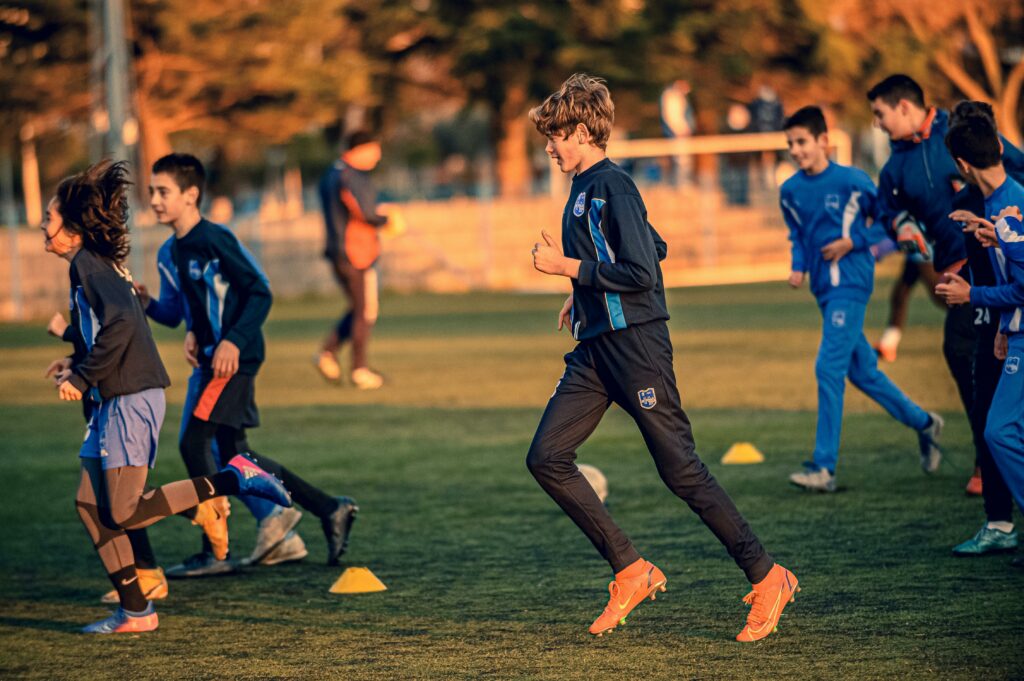When kids are little, parents often fill their weeks with sports, music, and other activities because it’s “good for them.”
But as they grow older, something changes. Suddenly, sport takes a back seat. Homework, grades, and test results start to matter more. Many parents begin to feel more comfortable promoting academics than athletics — even if their child truly loves the field, the court, or the team.
This shift raises an important question: how can we create a school vs sport balance for children that truly supports their growth?
Why should it be one or the other?
Why not help our kids find a balance, where sport becomes a lever for performance and fulfilment, not a distraction from it?
Sport teaches focus, resilience, and adaptability ; the same skills that drive learning and success in school. When both work together, children don’t just perform better; they grow better.
1. Why the shift happens?
As children move into middle or high school, parents often feel growing pressure from the education system. Exams, rankings, and grades suddenly define success. Sport — once seen as a fun way to build confidence — is now seen as “extra.”
Yet research shows this mindset is misleading.
The University of Sydney found that students who stay involved in sports through their teenage years have better focus, attendance, and academic results than those who quit early (University of Sydney, 2024).
So, rather than competing for time, sport and academics can support each other.
2. The educational value of sport
Sport builds more than physical skills — it develops mental tools essential for school and life.
| Sport Skill | How it translates to school |
|---|---|
| Focus & Concentration | Learning to block distractions on the court helps focus during class or study sessions. |
| Resilience | Losing a match teaches you to reflect, adapt, and try again — just like after a tough test. |
| Goal setting | Breaking performance goals into steps mirrors planning study schedules or projects. |
| Consistency & Routine | Training regularly builds habits that make daily studying easier. |
| Emotional regulation | Managing nerves before a match prepares students to handle exam pressure calmly. |
| Social connection | Team sports build empathy, communication, and leadership — skills valuable in classrooms and future workplaces. |
3. Integrating sport and academics for growth
The key is not to choose between school or sport, but to create space for both.
Every child is different — some may dream of going professional, others love the social part, and others simply find confidence through movement.
Parents can help by:
- Allowing kids to explore different sports without pressure.
- Recognizing that physical activity enhances brain function and memory (WHO, 2023).
- Supporting schedules that balance homework and sport — instead of seeing one as “stealing time” from the other.
- Valuing effort and enjoyment as much as results.
When a child feels trusted to follow both passion and responsibility, they learn something powerful: how to manage time, emotions, and purpose.
4. When learning takes many forms
As some students once asked, “Why do we study music?” — their teacher proudly replied, “Why do we study math?”
Both matter. Both teach something different.
Learning doesn’t happen in one place or in one way.
Sport develops the mind as much as school develops logic. A well-rounded education includes books and movement, effort and play, precision and emotion.
Children who experience both sides grow not only in knowledge, but in character, adaptability, and curiosity — the real skills that shape their future.
School and sport should not compete — they should coexist.
One sharpens the mind, the other strengthens the character. Together, they help children discover who they are, what they love, and how they grow.
As parents, our role is not to choose the path for them, but to create balance , to facilitate their development (mental and physical), to let them try, fail, and rise again. Because the most valuable skill for their future will be the ability to adapt, adjust, and keep learning through every challenge they face.

